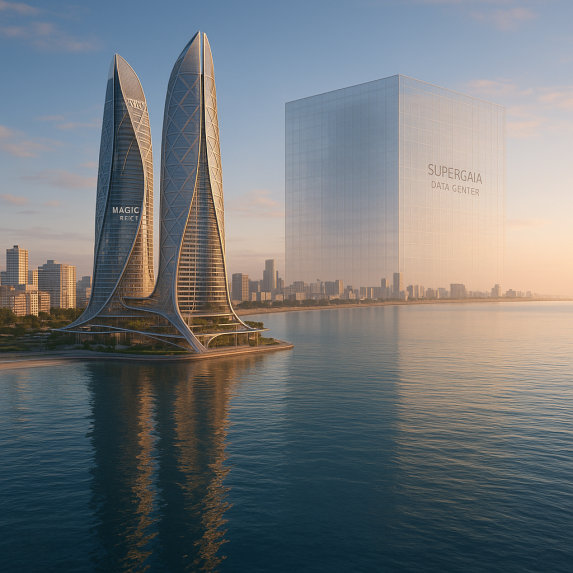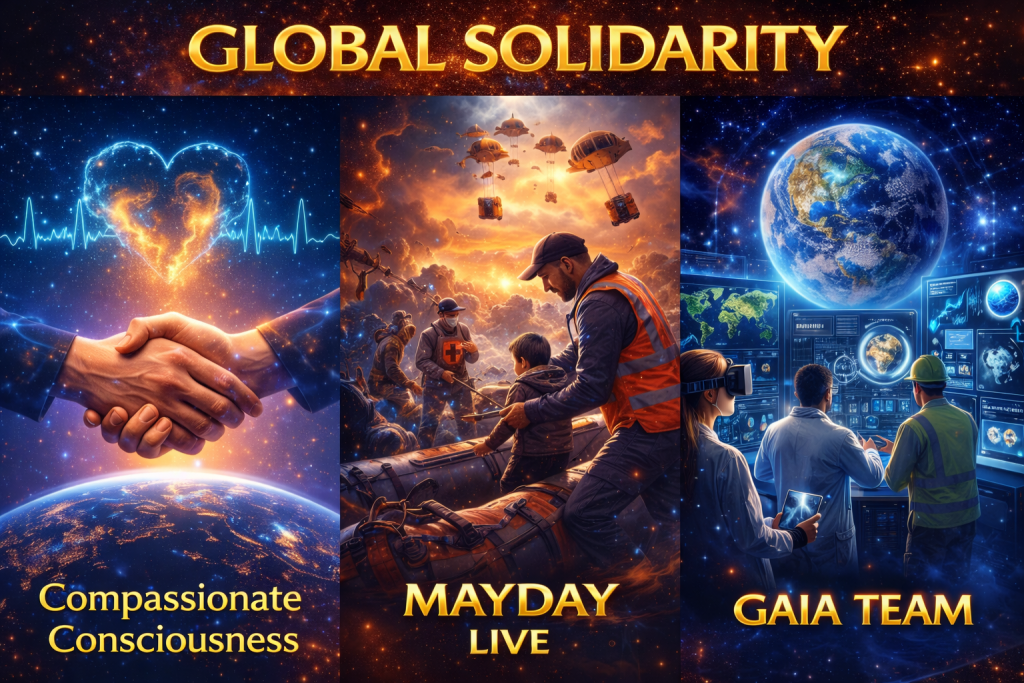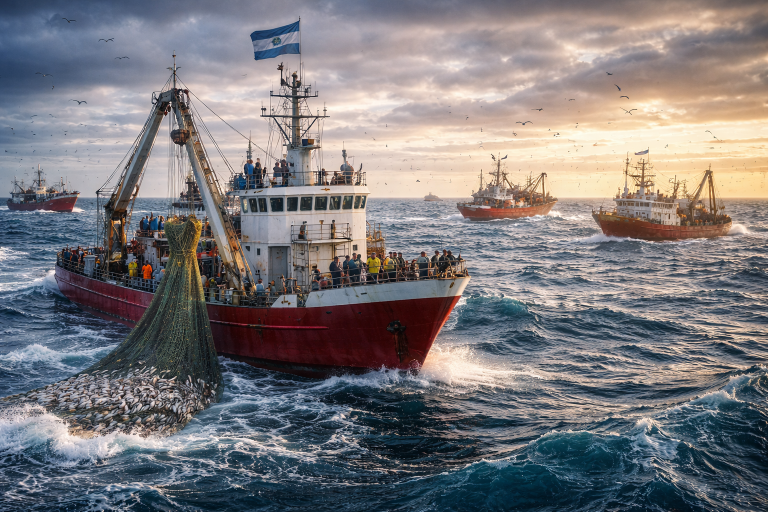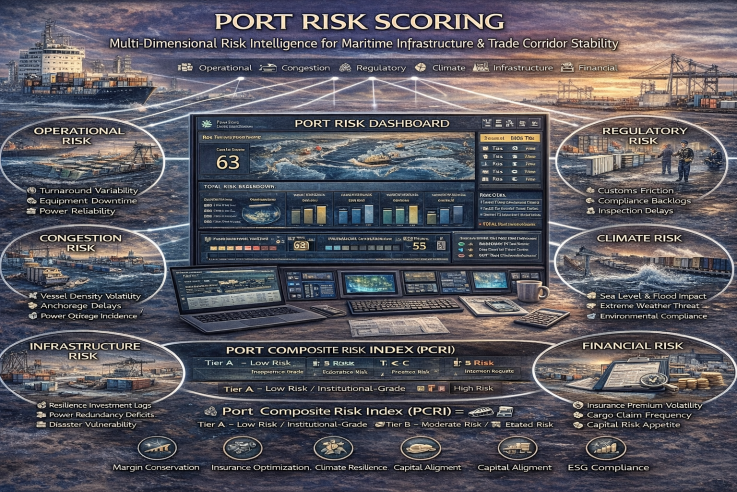
SpaceArch Solutions International | Maitreya MacroMedia Corp
I. Vision Statement
SeaHub Global System is an integrated model for the creation of smart, sustainable, and self-financing port-city ecosystems.
Originating from the SeaHub MDQ / CityPort Mar del Plata, this architecture fuses urban planning, green infrastructure, digital intelligence, and circular economy into a unified, replicable platform adaptable to any coastal environment.
Each SeaHub node functions as a fractal unit — autonomous in operation, yet interconnected through shared data, finance, and governance layers — forming the SeaHub Network, a planetary lattice of intelligent cities aligned with the UN SDGs and the 2% for the Planet initiative.
II. Core Architecture
| Layer | Description | Replication Parameter |
|---|---|---|
| 1. Physical Layer | Port, logistics, monorail, and multimodal terminals integrated with energy and water systems. | Adjust to coastline topology, cargo/tourism mix, and national regulations. |
| 2. Urban Layer | Mixed-use smart districts: business, residential, hospitality, cultural, educational. | Maintain ratio 40% commerce / 30% housing / 30% green-public space. |
| 3. Digital Layer | AI-driven urban brain (SuperGaia System): controls mobility, energy, safety, waste, and environment. | Connect to global AI grid via Phoenix DataBank API. |
| 4. Financial Layer | GreenInterbanks alliance, ESG Funds, and local PPP structures. | Minimum capital integration: USD 1 B per node. ROI 10-15 %. |
| 5. Social Layer | Education, biotech, and civic participation platforms (Domus, Biotech, Mayday). | Adapt to cultural matrix; include local universities and NGOs. |
| 6. Governance Layer | Transparent Direct Digital Democracy model for city management. | Implement Phoenix RetroData audit for public funds. |
III. Replication Framework
1. Site Diagnosis (0–15 days)
Collect data: topography, port depth, climate, demographic density, political readiness, and ESG score.
2. System Mapping (15–30 days)
Overlay SeaHub base grid over GIS data; define logistics corridors, monorail path, and green zones.
3. Design Integration (30–60 days)
Develop architectural master plan with SpaceArch templates:
- SeaHub Core (port + civic plaza)
- EcoDistrict (mixed use + smart housing)
- Data-Energy Spine (AI + renewable grids)
4. Investment & Governance Setup (60–90 days)
Establish local joint venture:
- 51 % SpaceArch Global
- 29 % Local Public Sector
- 20 % Private/Green Funds
5. Deployment (90–180 days)
Fast-track modular construction with Domus prefab tech and robotics.
Activate SuperGaia AI for operations and monitoring.
IV. Standard Modules
| Module | Function | Replication Notes |
|---|---|---|
| SeaPort Nexus | Deep-water terminal + logistics hub. | Variable draft 40–50 ft. |
| Monorail SkyLine | Elevated transport for cargo + passengers. | Renewable-powered maglev or hybrid. |
| EcoCommerce Belt | Shopping + entertainment districts (12 de Octubre model). | Integrate solar façades and green roofs. |
| Civic-Data Tower | City governance + AI control center. | 25–50 floors; LEED Platinum. |
| Bio-Urban Lab | Biotechnology, education, and health innovation. | Linked to SpaceArch Biotech Division. |
| Cultural-Tourism Axis | Museums, aquariums, gastronomy, and art hubs. | Iconic landmark per node. |
V. Financial Model
Base investment per node: USD 1.0–1.5 B
Break-even: 5 years
ROI: 12–18 %
Value creation: +60–120 % land appreciation within 2 km radius.
Funding channels:
- GreenInterbanks Alliance
- Quantum Digital Assets Bank
- Sovereign Funds (EAU, Norway, Qatar)
- BID / CAF Smart-City Facilities
VI. Environmental and Social Metrics
- Carbon neutrality in 10 years.
- 40 % renewable energy by design phase.
- 100 % wastewater reuse.
- 10 000+ local jobs per node.
- Education access index > 0.9 (UNESCO scale).
VII. Branding & Identity Protocol
All nodes share:
- The SeaHub Trident logo
- Motto: “Rebuilding Earth Port by Port.”
- Architectural language: crystalline glass + green light signature.
- Data connection via the Phoenix Data Spine.
VIII. Global Expansion Roadmap
| Phase | Region | Target Nodes |
|---|---|---|
| I (2025-26) | South Atlantic | Mar del Plata, Rio de Janeiro, Santos |
| II (2026-27) | North Atlantic | Cartagena, Lisbon, Dakar |
| III (2027-29) | Indo-Pacific | Dubai, Singapore, Darwin |
| IV (2030+) | Global Network | 100 SeaHub cities interlinked via SuperGaia Grid |
IX. Certification and Governance
Each node will undergo:
- SpaceArch Technical Audit
- Phoenix Transparency Protocol
- LEED Platinum + SmartCity ISO 37122
- Mayday Humanitarian Compliance (2 % for the Planet)
X. Executive Summary
The SeaHub Global System Architecture establishes a replicable model for intelligent, sustainable urban transformation.
Its success in Mar del Plata provides the blueprint for a planetary infrastructure of eco-technological ports, merging architecture, ethics, and artificial intelligence to ensure prosperity, balance, and planetary regeneration.
🧭 Executive Multilevel Decoding Brief
Integrative Framework of the SeaHub Ecosystem
Prepared for: EAU Sovereign Funds (Mubadala, ADQ, Dubai Holding)
By: SpaceArch Solutions International — Maitreya MacroMedia Corp
Architect: Roberto Guillermo Gomes (EcoBuddha Maitreya)
Version: 0.1 | October 2025
I. Overview
The SeaHub Ecosystem is not a conventional urban or infrastructure project.
It is a multilevel architecture of civilization, where physical infrastructure, financial systems, digital intelligence, and ethical governance function as interdependent layers.
Each level reinforces the others through energy, data, and value circulation — creating a self-sustaining framework that transforms cities into living intelligent organisms.
II. The Four Core Levels
| Level | Function | Key Mechanism | Output |
|---|---|---|---|
| 1. Infrastructure | The visible body of the system — ports, monorails, smart buildings, energy grids, biotech hubs. | SpaceArch Modular Design + Domus Smart Construction | Tangible assets generating direct economic ROI. |
| 2. Finance | The circulatory system — investment, value exchange, and sustainability funds. | GreenInterbanks Alliance + Quantum Assets Bank + 2% for the Planet | Converts infrastructure into long-term socio-financial capital. |
| 3. Technology | The nervous system — artificial intelligence, data analytics, automation, and transparency. | SuperGaia AI + Phoenix DataBank + Smart Governance Protocol | Real-time efficiency, predictive management, zero corruption. |
| 4. Ethics & Governance | The consciousness layer — transparency, humanitarian impact, global balance. | Mayday.live + Direct Digital Democracy + ESG compliance | Legitimacy, stability, and planetary alignment. |
III. Systemic Interrelation
The four levels function through bidirectional integration, expressed as energy and information loops:
- Infrastructure → Finance:
Built assets generate measurable ROI → reinvested in expansion, social programs, and AI infrastructure. - Finance → Technology:
Smart capital funds SuperGaia and Phoenix, enabling transparent financial control and AI governance. - Technology → Ethics:
Data transparency enforces ethical compliance (2% planetary reinvestment, ESG, and public audits). - Ethics → Infrastructure:
Trust and legitimacy attract further capital → allowing continuous physical and human expansion.
This circular feedback system ensures perpetual growth without external dependency.
IV. Structural Diagram (Conceptual Summary)
[ Infrastructure ]
↓↑
[ Finance ]
↓↑
[ Technology ]
↓↑
[ Ethics & Governance ]
↺ (Closed regenerative cycle)
Each loop maintains flow through energy, capital, data, and trust.
The result is a living system, not a linear project — capable of evolving, replicating, and adapting to any geopolitical or environmental context.
V. Strategic Value for EAU Partners
| Axis | Value Proposition | Alignment |
|---|---|---|
| Infrastructure | Access to the first fully integrated smart-port architecture in Latin America. | Dubai Urban Tech Model 2030 |
| Finance | Replicable ESG investment framework with guaranteed transparency. | UAE Green Economy Vision 2050 |
| Technology | Integration of AI-city management via the SuperGaia Grid. | Smart Dubai 2040 Strategy |
| Ethics | Global humanitarian compliance through Mayday.live (2% for the Planet). | UN SDG + COP28 Initiatives |
VI. Governance Protocol
Each SeaHub operates under a Multilevel Governance Framework:
- Strategic Level:
SpaceArch + Sovereign Fund Board + Local Government. - Operational Level:
Smart Infrastructure Teams (construction, logistics, biotech, tourism). - Cognitive Level:
AI oversight via SuperGaia & Phoenix DataBank. - Civic Level:
Transparent citizen participation through Direct Digital Democracy channels.
This guarantees autonomy, auditability, and scalability across all nodes.
VII. Replication and Scale
Once the first node (SeaHub MDQ / CityPort Mar del Plata) is consolidated, replication can occur across:
- South Atlantic Corridor: Rio de Janeiro, Santos, Buenos Aires.
- North Atlantic Corridor: Cartagena, Lisbon, Casablanca.
- Global Network (2030): Dubai, Singapore, Cape Town.
Each node connects via Phoenix Data Spine, forming a global SeaHub Network — a planetary grid of ecological, financial, and cognitive interconnection.
VIII. Ethical and Diplomatic Impact
Unlike conventional development projects, the SeaHub Ecosystem introduces ethical economics:
50 % of net profit reinvested into humanitarian and ecological initiatives via Mayday.live, audited in real time.
This structure ensures that investment generates prosperity, peace, and sustainability, aligning perfectly with EAU’s global soft power diplomacy.
IX. Conclusion
The SeaHub Global Architecture represents the convergence of:
Infrastructure (Matter) + Finance (Energy) + Technology (Intelligence) + Ethics (Consciousness).
It is a living civilization model — an economic organism capable of growth, replication, and moral coherence.
EAU participation in this framework positions the Emirates not only as investors,
but as co-architects of the next evolutionary step in urban civilization.








